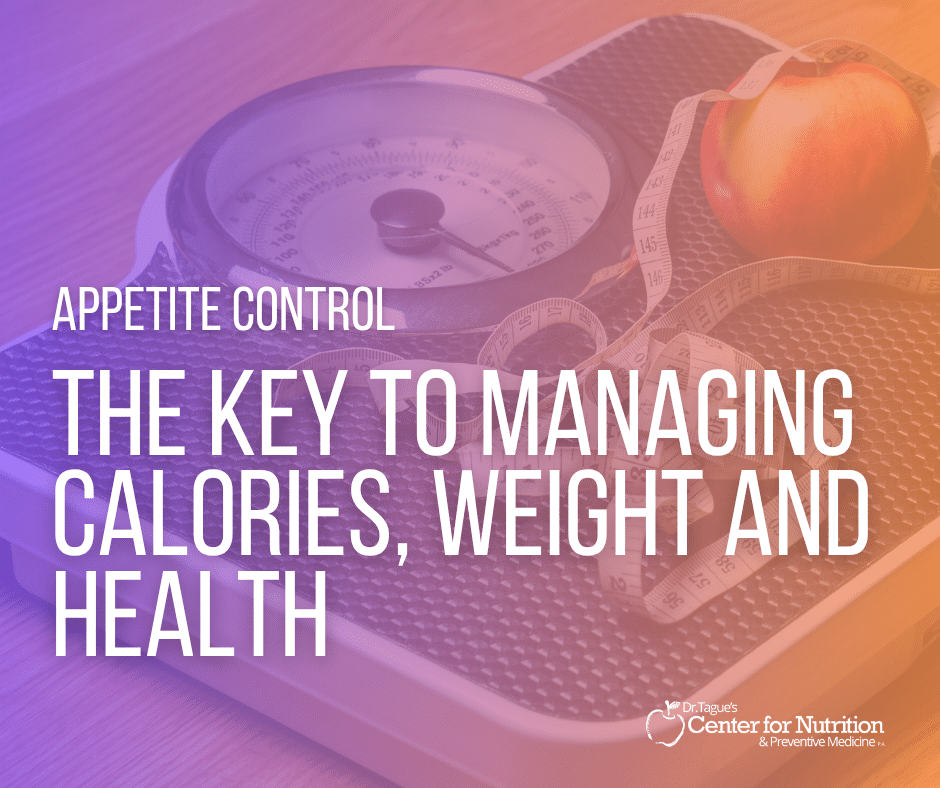Appetite goes far beyond the stomach-growling ache we know as “hunger”… you know, the gnawing feeling when our stomach is “crying” for food. Appetite is actually any motivation or desire to put calorie-containing substances into our mouths. It is increasingly rare for us in the U.S. to be so “hungry” that our stomach is in pain. Since food is literally everywhere and readily available, we choose to avoid that feeling by eating in advance.
Appetite that results in eating, on the other hand, is a roving, sneaky monster. It rears its ugly head when we least expect it, whether our stomachs are full or empty. And its results are devastating. Here are 5 aspects of real-world appetite that are very common and that have nothing to do with an empty stomach or “hunger”:
- Pleasure Eating (“Dr. Tague, if I’m honest, food is my greatest pleasure in life.”)
- Emotional Eating (“When I feel sad, I turn to food for comfort.”)
- Social Eating: Entertainment with food (“I like to go with my friends for pizza/beer/Mexican food/specialty coffee/___________.”)
- Stress Eating: (“When I am under stress, I have no control. I become a carb addict!”)
- Boredom Eating: (“I search the pantry for a snack when I am bored.”)
Why does understanding appetite matter? Because any small nudge that makes us MORE likely to put even a few extra food calories into our mouths each day will potentially have a huge impact over time. I’ve written before that adding one extra potato chip to our body’s daily calorie reserve each year results in 30 lbs of weight gain after 30 years. Small bites make a huge impact over time! For many reasons, appetite matters!
The dramatic power of appetite includes that it is:
- Subtle and stealth in its approach, since it “creeps up” on us
- Influential on our very thoughts about food
- Powerful to alter our behavior towards food
- Dramatic in its impact since eating influences our health
- Cumulative in its effect as it increases our weight over time
We typically respond to the “nudge” of appetite before we know what happened. Then, it is too late. Once we’ve eaten “it”, the consequences absolutely will follow. And, in a few hours, unless we change the appetite “nudge” tendency, it will happen all over again and the damage repeats itself, with the ever-accumulating consequences.
To achieve or maintain optimum health, including an optimum weight, everyone must control their appetite. And everyone can control their appetite with 3 simple steps:
Appetite Control Step #1: Assess your status!
Why are you eating the portions and types of food that you eat? Is your stomach “asking” to be fed? Is it an emotional need? A need for energy? A bad mood that simply needs time to resolve? Ask yourself why you are eating because Step # 1 is to be made fully aware of your current appetite status! Identify the problem!
Appetite Control Step #2: Strategize for success and control!
Depending on what area(s) of appetite are not well controlled, the strategies may or may not be obvious. It may mean avoiding fatigue or boredom. Some things, however, such as “avoiding stress” are easier said than done. But, if appetite excesses are mild, minor lifestyle changes may be all that is necessary. Adequate sleep, staying hydrated, maintaining healthy relationships are always the right thing to do. For many with problematic appetites, prescription appetite suppressant medications may be an important part of the complete answer. Whatever is required, don’t give up until you get yourself back in control!
Appetite Control Step #3: Embrace effective appetite strategies over time!
Unfortunately, appetite is present with us for the long haul. It therefore must be managed over the long haul. If you need to lose weight, the body often responds with an increasing appetite the more weight you lose. This “Rebound Appetite” also must be managed effectively. Strategize for the long term, the rewards are well worth it.
I believe that managing your appetite so that you can consume excellent, health-promoting nutrition (in controlled amounts!) long term is the primary key to optimum health. Start with an assessment of your appetite. Secondly, strategize for success. And, finally, embrace management strategies for the long term.


